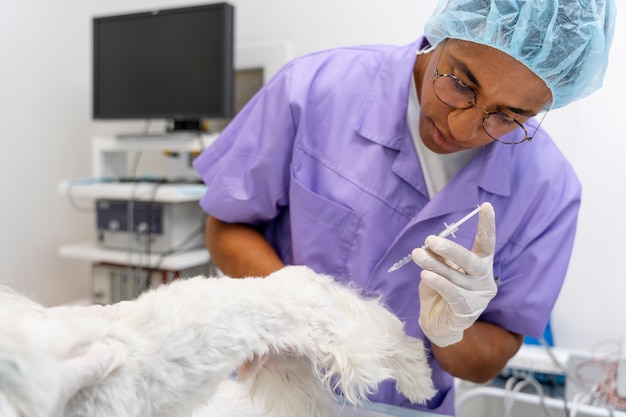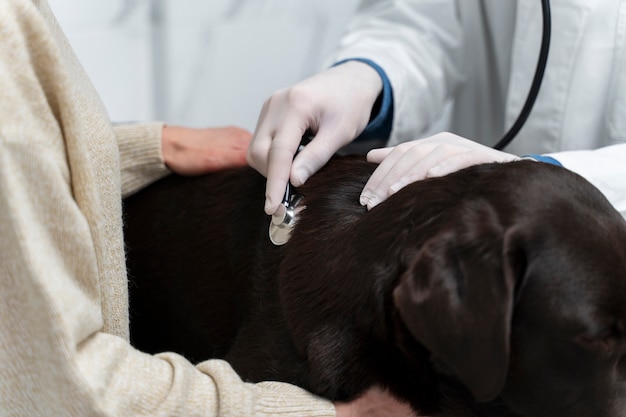Understanding Blood and Plasma Transfusions for Pets

Understanding Blood and Plasma Transfusions for Pets: Emergency Care at ReadyVets in Taylors, SC
When your pet faces a sudden health crisis, every moment counts. For many pet owners, the idea of a blood transfusion for pets can sound both alarming and confusing; yet, in certain emergencies, this advanced treatment can be truly lifesaving. If you ever find yourself searching for immediate help from an "emergency vet near me," knowing what to expect can make all the difference. At ReadyVets, located at 5314 Wade Hampton Blvd Suite A, Taylors, SC 29687, our veterinary team is dedicated to providing fast, expert care—including critical blood and plasma transfusions—when your pet needs it most.
This blog will help you understand when blood or plasma transfusions might be necessary, how our urgent care veterinary professionals perform these procedures, and what you can expect during your visit. We welcome walk-ins and are here with extended hours, making ReadyVets a trusted choice for emergency pet care in Taylors and surrounding communities. Whether you are facing a sudden accident, severe illness, or unexplained bleeding, our emergency veterinary care can offer immediate support for your pet’s urgent needs.
Let’s explore the signs, reasons, and the plasma transfusion procedure so you’ll know exactly how ReadyVets can help when every second matters.
Recognizing When a Blood or Plasma Transfusion May Be Needed
Key Signs Your Pet Requires Urgent Veterinary Attention
As a loving pet owner, identifying a potential emergency is crucial. Some situations develop quickly, while others may build over time but suddenly worsen. Recognizing when your pet might benefit from a blood transfusion for pets can be challenging, but certain symptoms are strong indicators that urgent care is warranted.
Warning signs include sudden weakness, pale or white gums, rapid breathing, collapse, or unexplained bruising or bleeding. Additional symptoms such as severe lethargy, vomiting blood, or difficulty standing may suggest serious blood loss or clotting disorders. In some cases, pets recovering from surgery or trauma may show signs like persistent bleeding from wounds, swollen limbs, or trouble regulating body temperature. If your pet has been exposed to toxins—such as rat poison—or is known to have an immune-mediated disease, sudden drops in energy or visible blood in urine or stool should never be ignored.
Whenever you notice these symptoms, it is important to seek immediate care from an "urgent care vet near me." Delaying treatment can put your pet’s life at risk, especially if blood or plasma transfusion is required. Our veterinary team at ReadyVets is equipped to quickly assess and stabilize your pet, offering walk-in exams for these critical situations.
Understanding the Causes: Why Blood and Plasma Transfusions Are Needed
Common Conditions That Lead to Blood Loss or Clotting Problems
Blood and plasma transfusions are advanced treatments used to address a variety of life-threatening conditions in pets. Understanding the reasons why your pet might need this level of care can help you act quickly in an emergency.
Blood loss can occur due to trauma, such as being hit by a car, deep lacerations, or internal injuries. Surgical complications, especially during procedures involving the abdomen or chest, may also cause sudden drops in blood volume. Some medical conditions, like immune-mediated hemolytic anemia (IMHA), cause the body to destroy its own red blood cells, leading to rapid anemia. Severe infections, cancer, or even parasites can contribute to blood loss over time.
Plasma transfusion procedures are often required for pets experiencing problems with blood clotting. This can arise from inherited disorders, liver failure, or exposure to anticoagulant toxins. In these cases, a pet’s blood may not clot properly, resulting in spontaneous bleeding or the inability to stop even minor injuries from becoming serious.
In the Taylors area, where outdoor pets may encounter wildlife, accidental poisoning or injuries are not uncommon. Our team at ReadyVets is prepared to diagnose and treat these emergencies, offering life-saving plasma transfusion procedures and blood transfusions in Taylors, SC, and the surrounding communities.
How Blood and Plasma Transfusion Procedures Are Performed at ReadyVets
What Happens During Emergency Blood and Plasma Transfusion for Pets
When your pet arrives at ReadyVets during an emergency, our veterinarians move swiftly to assess vital signs, perform in-house diagnostics, and determine if a transfusion is necessary. Our in-house laboratory allows for rapid blood typing and cross-matching, which are essential steps to ensure compatibility and safety for your pet.
If a blood transfusion for pets is needed, we start by selecting a donor whose blood matches your pet’s type. The process involves collecting blood from a healthy donor pet, carefully screening for infectious diseases, and then administering the blood through an intravenous (IV) line. Throughout the transfusion, our veterinary professionals closely monitor your pet’s heart rate, blood pressure, and overall comfort to detect any signs of reaction. The goal is to restore healthy blood levels, improve oxygen delivery to tissues, and stabilize your pet’s condition quickly.
For a plasma transfusion procedure, the process is similar, but only the plasma portion of the blood is transfused. Plasma contains important clotting factors and proteins, making it essential for pets suffering from bleeding disorders or certain toxicities. Plasma is separated from whole blood and then given to your pet intravenously, often in combination with other supportive treatments.
Our facility at 5314 Wade Hampton Blvd Suite A, Taylors, SC 29687 is equipped with advanced diagnostic tools, allowing us to provide these critical interventions without delay. To learn more about our specific capabilities, visit our page on blood and plasma transfusion for pets.
What to Expect During Your Visit
During your emergency visit, our team will walk you through each step, answer your questions, and provide updates on your pet’s progress. The length of the transfusion can vary, ranging from one to several hours depending on your pet’s needs and response. After the procedure, most pets require monitoring to ensure stability and to address any underlying conditions that led to the emergency.
Rest assured, our veterinary team is committed to delivering compassionate, expert care—no appointment needed. We are always ready to support you and your pet through even the most challenging emergencies.
How to Support Your Pet Before and After a Transfusion
Immediate Steps and Home Care Considerations
If you suspect your pet is experiencing severe blood loss or a clotting disorder, the most important action is to transport them to ReadyVets as quickly and safely as possible. Avoid offering food or water until your pet has been evaluated by our veterinarians, as some emergencies may require immediate surgery or sedation. Keep your pet calm and minimize movement during transport, especially if you notice active bleeding.
After a blood or plasma transfusion procedure, your pet may need extra rest and close observation at home. Watch for any signs of renewed weakness, difficulty breathing, or unusual swelling. Keep follow-up appointments as recommended by our team, and administer any prescribed medications exactly as directed. Pets recovering from trauma or illness often benefit from a quiet, comfortable space away from household commotion.
To reduce the risk of future emergencies, consider keeping household toxins—such as rodenticides and certain human medications—well out of reach. Regular wellness checks can help spot some conditions early. While not all emergencies are preventable, being aware of your pet’s normal behavior and health can help you act quickly if something seems wrong.
When Should You Seek Emergency Veterinary Care?
Acting Quickly Can Save Your Pet’s Life
Knowing when to seek immediate medical attention is vital. If your pet shows signs of severe weakness, collapses, has pale gums, is bleeding without explanation, or seems unable to breathe normally, do not wait—bring them directly to ReadyVets. Rapid action is especially important if your pet has been injured, exposed to toxins, or diagnosed with a blood disorder.
Our clinic welcomes walk-ins and is open during extended hours, including times when regular veterinary offices may be closed. If you are searching for an "emergency veterinarian near me" or "urgent care vet near me," remember that our emergency veterinary care is always available to provide life-saving interventions, including blood and plasma transfusion for pets in Taylors, SC.
Compassionate Emergency Care Close to Home
Blood and plasma transfusions can mean the difference between life and death for pets facing severe emergencies. At ReadyVets, we understand how frightening these situations can be, and our veterinary team is here to offer clear guidance, advanced treatment, and unwavering support. If your pet is showing signs of a serious problem, remember that walk-ins are welcome, and no appointment is needed at our conveniently located Taylors facility.
If you ever need an "emergency vet near me" or find yourself searching for blood transfusion for pets in Taylors, SC, you can count on ReadyVets to provide immediate, expert care. Our compassionate approach, full in-house diagnostics, and commitment to serving Taylors and surrounding communities make us your trusted partner during any pet emergency.
For more information on our advanced transfusion capabilities or other urgent care services, visit our blood and plasma transfusion for pets page or explore our comprehensive veterinary care services. If you have any questions or need immediate assistance, call (864) 920-2777 or visit us at 5314 Wade Hampton Blvd Suite A, Taylors, SC 29687. We are here for you and your pet—every day, whenever emergencies happen.
Disclaimer: This blog is intended for informational purposes only and should not replace professional veterinary advice. If you believe your pet is experiencing a medical emergency, seek immediate veterinary care.


















